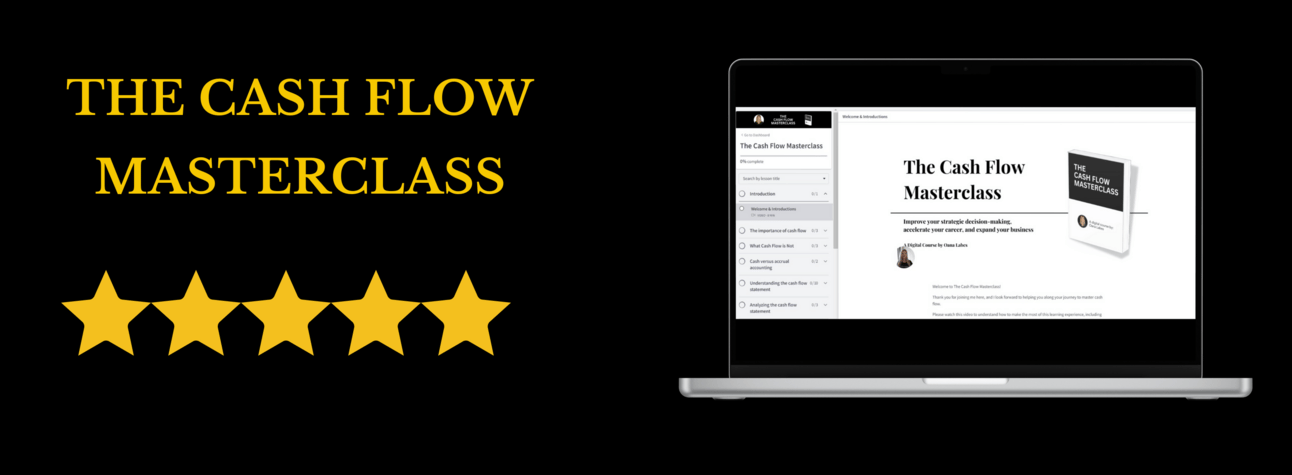
Welcome to a new edition of The Finance Gem 💎
weekly strategic finance gems to accelerate your career and grow your business
This week’s Strategic Finance Insights
What’s Strategic Finance?
Finance and Accounting: Basics vs. Advanced
Your Business Problems have Solutions
16 Powerful Cost Saving Strategies You Need to Know
Accounting vs. Finance Careers
All this and more Let’s dive in!
This newsletter edition is brought to you by Divvy from Bill.com. Free yourself from manual expense reports with BILL's spend & expense management solution. You can track and control spending, automate expense reports, and close your books in record time. Divvy offers fully automated expense reports, flexible and enforceable budgets, and scalable business credit that fits your needs. Get to know Divvy with a quick, 20-minute demo and enjoy a $100 Amazon gift card.* (US Residents only, conditions apply)
Have you visited my digital store yet? Many of my viral cheat sheets, checklists and infographics are now available in full resolution, so go check them out and turn your favorites into posters!
New this week
The Finance Gem 💎 Referral Program is here - read about it below
If you’re reading for the first time, please subscribe here
What I’ve Been Reading

Finance is not only about technical skills. There are many things you have to master: communication, presentation skills, business partnering. Subscribe to FP&A Stories to received insights, opinion and help about these topics every week in your mailbox.
What’s Strategic Finance?
Here are 9 Critical Things You Need to Know.👇
1️⃣ Strategic Finance (or Strategic Financial Management) is a financial planning powerhouse function bringing together
☑️Strategy
☑️Finance
☑️Corporate Development
2️⃣ In smaller organizations with constrained resources, Strategic Finance is typically merged with FP&A:
☑️ both roles are performed by 1-2 analysts
☑️ focus is often on more immediate operational needs, specifically on forecasting 12 - 18 months ahead and tracking actual results to plan
3️⃣ Strategic Finance is all about adopting and maintaining a long term view: ☑️objective is to drive the long term plans that support the organization’s strategic objectives
4️⃣ Strategic Finance is driven by the ultimate objective of maximizing shareholder value through:
☑️sustainable growth and profitability
☑️adequate liquidity
☑️balancing leverage while maintaining financial flexibility
5️⃣ Strategic Finance functions:
☑️analyze and quantify viable strategic objective
☑️monitor and evaluate performance
☑️support overall optimal decision making related to strategic investment in, or financing of, organizational assets
6️⃣ The tools of Strategic Finance include:
☑️ strategic analysis frameworks like PESTLE, SWOT and the Value Chain Analysis, and
☑️ financial modelling, financial analysis, and capital budgeting tools
7️⃣ Strategic Finance is a continuous process:
☑️companies need to constantly analyze their external environment for new opportunities and threats
☑️evaluate external environment impact on strategic initiatives
☑️adjust the financial strategy to stay on track
8️⃣ In some organizations Strategic Finance is part of FP&A
☑️may not an effective structure because the “financial” in financial planning and analysis may reduce the effectiveness of the FP&A function
☑️excessive focus on forecasting, budgeting and meeting short-term objectives
☑️insufficient “planning and analysis” to help develop and execute strategy
9️⃣ When empowered to operate independently as a business partner to FP&A, Strategic Finance can deliver immense value and sustainable growth to organizations.
🎯If want Effective Long Term Strategic Planning, you should consider letting Strategic Finance run with it.

Finance and Accounting Basics vs. Advanced
Don't get them confused.
101 sets the groundwork with fundamental tools and principles
201 goes on to tackle risk management and advanced analysis for strategic financial decision-making
🎯 Finance and Accounting 101
1. Foundational Financial Statements: How do we represent a company's financial position and performance?
2. Core Bookkeeping Concepts: How do we systematically record and categorize business transactions?
3. Basic Accounting Principles: When and how do we recognize revenues and expenses in our books?
4. Depreciation and Inventory Valuation: How do we allocate the cost of assets over time and determine the value of our inventory?
5. Introductory Financial Analysis: How can we assess a company's financial health using ratios?
6. Budgeting Basics: How can a company plan for its financial activities and expenditures?
7. Working Capital Essentials: How does a company effectively manage its daily operational finances?
🎯 Finance and Accounting 201:
1. Advanced Time Value Concepts: How does the value of money change over time, and what implications does this have on investments?
2. Capital Investment Analysis: How do we evaluate the worthiness of an investment or project?
3. Risk Assessment and Management: How do we measure and incorporate financial risks in our decision-making?
4. Deep Dive into Capital Structure: How does a mix of debt and equity affect a company's financial strategy and cost?
5. Dividend Theories and Policies: What considerations influence a company's decisions about dividends?
6. M&A Accounting and Strategy: How do companies value, account for, and integrate business combinations?
7. Advanced Financial Analysis: How can we perform a detailed evaluation of a company's financial statements for in-depth insights?
Your Business Problems have Solutions

Most business problems fall into one of 3 main areas:
1️⃣ Profitability
2️⃣ Cash Flow
3️⃣ Growth
Use financial analysis techniques to identify and address them.
1️⃣ Profitability Issues
🎯 Gross Profit Margin Analysis: (Gross Profit / Revenue) x 100
🎯 Operating Profit Margin Analysis: (Operating Income / Revenue) x 100
🎯 Net Profit Margin Analysis: (Net Income / Revenue) x 100
2️⃣ Cash Flow Issues:
🎯 Segment cash flow by sources & uses into operations, investing, and financing
Analyze to identify trends, forecast future cash flows, and highlight potential liquidity problems
🎯 Measure the cash a generated after accounting for cash outflows needed to support operations and to maintain productive output (free cash flow)
🎯 Measure how long the business will be deprived of cash if it increases its investment in resources in order to expand customer sales (cash conversion cycle)
3️⃣ Growth Issues:
🎯Sustainability:
Revenue Growth Rate: Current period revenue / Prior period revenue - 1
🎯Risk:
Operating Leverage: % Change in Operating Income / % Change in Sales
Financial Leverage: Total Liabilities / Total Equity
🎯Debt Service Capacity:
Fixed Charge Coverage Ratio (FCCR): (EBIT or EBITDA less Cash Outflows) / Total Fixed Payment Obligations
16 Powerful Cost Saving Strategies You Need to Know
🎯 Sooner or later, you will need to start making strategic decisions in your company.
🎯 Here's a list of 16 powerful strategies you can consider for your costs.
☑️ Just-In-Time Inventory System (JIT):
- Maintain minimal inventory
- Order as required
- Reduce holding costs
- Avoid overstocking
☑️ Vendor-Managed Inventory (VMI):
- Suppliers manage inventory
- Inventory off company balance sheet
- Needed for production
☑️ Consolidation of Suppliers:
- Reduce supplier numbers
- Streamline procurement
- Bulk-purchase discounts
☑️ Outsourcing Production:
- Don't own factories
- Outsource production
☑️ Offloading Fixed Assets & Leasing:
- Sell and lease back assets
- Convert fixed to variable costs
- Improve financial ratios
☑️ Operational Efficiency:
- Refine processes
- Use technology
- Lower operation costs
☑️ Switch to Variable Cost Models:
- Use contract employees
- Convert fixed to variable labor
☑️ Strategic Supplier Relationships:
- Strong supplier relationships
- Negotiate favorable terms
- Lock-in prices, priority access
☑️ Vertical Integration:
- Control supply chain
- Eliminate markup
- Cost savings
☑️ Adopting Technology and Automation:
- Automation solutions
- Reduce labor-intensive tasks
- Lower labor costs
☑️ Focus on Core Competencies:
- Spin off non-core segments
- Focus on primary competencies
- Reduce overhead costs
☑️ Shared Service Models:
- Centralize back-office
- Economies of scale
- Reduce redundancy
☑️ Energy Efficiency and Sustainability:
- Invest in energy efficiency
- Sustainable practices
- Long-term savings
☑️ Economies of Scale:
- Increase production volume
- Spread fixed costs
- Reduce cost per unit
☑️ Relocating Operations:
- Move operations
- Lower costs regions
- Tax incentives, favorable regulations
☑️ Product Simplification:
- Reduce product complexity
- Streamline operations
- Reduce diverse product costs
The Cash Flow Masterclass keeps getting great reviews!
If you’re still unsure if this course is for you, consider this:
☑️ it takes less than 2 hours to breeze through it and you can pause anytime
☑️ you will be applying what you learn for the rest of your career
☑️ the cost is nominal compared to the value and payment plans are available
☑️ you get dynamic financial models included in the course to use afterwards
☑️ you get lifetime access on any device (audio mode available in the app)
Enroll today - your career and your organization will thank you!

Accounting vs. Finance Careers
Hint: they're not at all the same thing.
And crossing over from one to the other isn't easy.
Accounting and Finance are not the same.
They are distinct functions in every company.
And they each require a different focus and skills.
Accounting focuses on record keeping, reporting & compliance.
Finance looks forward and focuses on supports business decision-making.
Both functions play critical and complementary roles in achieving the company's financial goals.
➡ So what are the main roles in each function?
⚫Accounting Roles include: Staff Accountant, Senior Accountant, Accounting Manager, Controller, Chief Financial Officer
⚫Finance Roles include: Financial Analyst, Senior Financial Analyst, Financial Manager, Chief Financial Officer, Investment Banker
➡What about the required designations?
⚫Accounting designations include: CPA (Certified/Chartered Professional Accountant), CMA (Certified Management Accountant), CIA (Certified Internal Auditor), CGMA (Chartered Global Management Accountant)
⚫Finance designations include: CFA (Chartered Financial Analyst), FRM (Financial Risk Manager), CAIA (Chartered Alternative Investment Analyst), CPA (Certified/Chartered Professional Accountant)
➡And how about the softs kills needed for success?
⚫ Key Soft skills in Accounting include: Detail oriented, Conservative thinking, Analytical and Organized, Process driven, Business acumen, Problem solving and Critical thinking
⚫ Key Soft skills in Finance include: Research Oriented, Analytical and Collaborative, Risk-taking, Innovative thinking, Results driven, Business acumen, Communication, Problem solving and Negotiation
Poll Time
How did it feel reading this week's issue?
As always, if you have suggestions or feedback, simply reply to this email.
Referral Program
If you’re enjoying this newsletter, please forward it to a friend. It only takes 3 seconds. Writing this took 4 hours.
Plus, you’ll get exclusive finance gem rewards!
Looking for More ?
Upgrade your strategic finance skills with The Cash Flow Masterclass, my highly reviewed, on-demand video course.
Work with me. Tap into my 20+ years of strategic finance & business intelligence, and get coaching for your own career. Availability is very limited. Book here.
Get growth business advisory for your organization with short, medium and long term financial planning, and big-picture financial models so you’re always finance-ready. Reach out here.
Sponsor a future issue of The Finance Gem 💎and get your brand in front of an exceptional audience of strategic finance, accounting, sales and technology professionals and executives.
Train your team on strategic finance concepts and elevate their knowledge, decision-making and productivity. Reach out here.
Thanks so much for reading. See you next week.
Oana

:






